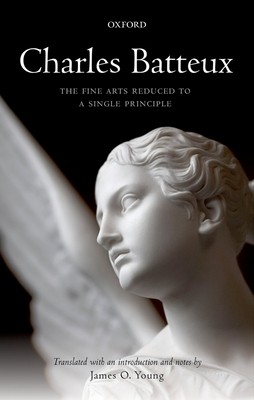
- We will send in 10–14 business days.
- Author: James O Young
- Publisher: Oxford University Press, USA
- ISBN-10: 019874711X
- ISBN-13: 9780198747116
- Format: 14.2 x 21.8 x 1.8 cm, hardcover
- Language: English
- SAVE -10% with code: EXTRA
Charles Batteux: The Fine Arts Reduced to a Single Principle (e-book) (used book) | bookbook.eu
Reviews
Description
The Fine Arts Reduced to a Single Principle (1746) by Charles Batteux was arguably the most influential work on aesthetics published in the eighteenth century. It influenced every major aesthetician in the second half of the century: Diderot, Herder, Hume, Kant, Lessing, Mendelssohn, and others either adopted his views or reacted against them. It is the work generally credited with establishing the modern system of the arts: poetry, painting, music, sculpture and dance. Batteux's book is also an invaluable aid to the interpretation of the arts of eighteenth century. And yet there has never been a complete or reliable translation of The Fine Arts into English. Now James O. Young, a leading contemporary philosopher of art, has provided an eminently readable and accurate translation. It is fully annotated and comes with a comprehensive introduction that identifies the figures who influenced Batteux and the writers who were, in turn, influenced by him. The introduction also discussesthe ways in which The Fine Arts has continuing philosophical interest. In particular, Young demonstrates that Batteux's work is an important contribution to aesthetic cognitivism (the view that works of art contribute importantly to knowledge) and that Batteux made a significant contribution to understanding the expressiveness of music. This book will be of interest to everyone interested in the arts of the eighteenth century, French studies, the history of European ideas, and philosophy of art.
EXTRA 10 % discount with code: EXTRA
The promotion ends in 20d.08:00:15
The discount code is valid when purchasing from 10 €. Discounts do not stack.
- Author: James O Young
- Publisher: Oxford University Press, USA
- ISBN-10: 019874711X
- ISBN-13: 9780198747116
- Format: 14.2 x 21.8 x 1.8 cm, hardcover
- Language: English English
the ways in which The Fine Arts has continuing philosophical interest. In particular, Young demonstrates that Batteux's work is an important contribution to aesthetic cognitivism (the view that works of art contribute importantly to knowledge) and that Batteux made a significant contribution to understanding the expressiveness of music. This book will be of interest to everyone interested in the arts of the eighteenth century, French studies, the history of European ideas, and philosophy of art.


Reviews